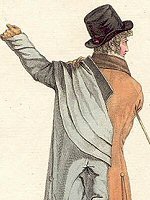Damien de Sancerre: Difference between revisions
No edit summary |
No edit summary |
||
| Line 46: | Line 46: | ||
[[Category:Former Characters]] [[Category:Births in 1788]] [[Category:Immigrants]] | [[Category:Former Characters|Sancerre]] [[Category:Births in 1788]] [[Category:Immigrants]] | ||
Latest revision as of 20:23, 13 February 2017
 |
|
| Portrayed by Placeholder: Former Character | |
| Full Name | Damien Donatien de Sancerre. |
|---|---|
| Title | Marquis de Sancerre |
| Associated Noble House(s) | Marquisate de Sancerre |
| Date of Birth | December 2nd, 1788 |
| Father | Rodrigue-Gerard de Sancerre |
| Father's Rank | Marqui de Sancerre |
| Mother | Madeline de Sancerre |
| Mother's Rank | Marquise de Sancerre |
| Town Residence | |
| Income | |
| School | |
| University | |
| Year Attained Title | 1804 |
Damien de Sancerre is a former character, created by Anna.
Family
- Father: Rodrigue-Gerard de Sancerre, [March 11th 1760]
- Mother: Madeline de Sancerre [July 20th 1769]
- Sister: Vivian Victoria de Sancerre (1790)
- Cousin: Alphonse de Sancerre (1782)
Background
The de Sancerres were a traditional family, originally from France, who enjoyed a life of privilege and admiration as a part of the French elite. Their names and reputations were known all through out the land, and even the royal family would often seek the company of its members. However, France was reaching a turbulent time in its history, not only on the political scene, with whispers of an upcoming revolution, but also in their morality, which began being questioned by the so-called libertines. Getting involved with such a crowd was the family's first mistake.
The man who would come to be Damien's father, Rodrigue-Gerard, was never too fond of traditional values nor a great fan of rules in a general sense. Having been in contact with all sorts of revolutionary ideas during his time in university, he decided that he too should rebel against society. It was during one of his displays of rebellious misbehaviour that he was caught robbing a liquor shop, and so the man was arrested under the charges of theft and libertarianism, and was then sent off to Château de Vincennes, where he remained for four years until he was freed, at which point the political scene in France caused him to believe the most cautious thing to do was leave.
Upon moving to England, where he had distant family, he managed to rebuild his life, marrying a young woman named Madeline who gave him two children: Damien and Vivian. However, medical and sanitary conditions were exactly the finest at the time, which led to her system shutting down merely hours after the little girl's birth, all due to a simple infection.
Rodrigue did manage to hold the family together at the same time as he went on trying to build up his reputation in the new country. Both children studied under the finest tutors, and also became well-educated in the Arts and Music areas, such as was expected of them. Rodrigue was mostly absent, only to be found either locked up in his den or at high-society parties whenever those were held, and so the family wasn't exactly close. To make matters worse, he had been long looking for a new wife, but unable to find love again and realizing he had lost his only joy to death years before, he took his own life, hanging himself in his den, not much long after Damien had turned fifteen.
Both siblings were then taken in by an elder cousin, who proceeded to handle their education
and upbringing, though the two were mostly left to the staff's care. Damien, in particular, took to his father personality-wise, and was always one for making scandals. Not so much for his actions, however, but for his ideas. During the time his father was in prison, he met with a certain other infamous Marquis, and the two exchanged letters up until his final day. After Rodrigue's death, Damien was the one who received the letters in his father's name, and so he became acquainted with the other man's obscene and often revolutionary ideas, becoming dangerously interested in it all.
Once he was through with his elementary studies, he also devoted himself to the art of the theatre and play-writing, inspired by his correspondent's ideas, though he wasn't as bold or, well, explicit. Instead, his provocative writing was hidden under his characters' lines, which enabled him to go on working in the business without too big a risk of losing clientèle and investors. Of course, people are not fully oblivious to his tendencies and 'inspirations', which has taken a toll in his personal image, society-wise, but some controversy never hurt anyone. Much. If anything, it made his name known through the city of London. Whether in a good way or in a bad one is besides the point.